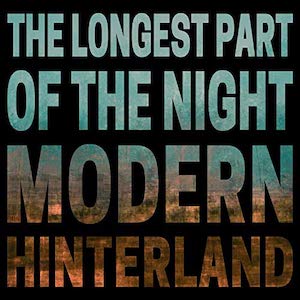 Modern Hinterland – The Longest Part of the Night
Modern Hinterland – The Longest Part of the Night
Label Fandango – 31 January 2020
The second album under the name of Chris Hornsby’s current project ‘Modern Hinterland‘ sees the band expand from an Anglo-Welsh-Canadian trio to a quartet with London-born guitarist Simon Shippey returning from New York to join the ranks alongside Tim Thackray and Colin Marshall’s rhythm section.
Again mapping musical territory that takes in folk, indie and Americana, Hornsby describes the new material as delving into the heart of divided modern Britain, fraught with anxiety and uncertainty and how this impacts on people’s relationships. It kicks off declaring I’m Not One Of The Free, a walking bassline setting things in motion as Hornsby sings “I was watching the rolling news as I find I increasingly do”, prompting a song about how, essentially, life can be crap if you’re not one of the privileged.
The jangling, cascading chords Right Here In My Heart turns to regret of moving on and leaving words never spoken (“I never did nothing to make you mine/Just sat there sinking bottles of wine”) before the arrival of the jaunty stroll-along rhythm of The Zombies (oddly reminding me of Iggy’s Passenger), another song about feeling isolated in a society of unthinking sheep, though, given Hornsby lived in Newcastle, this references Cabot Tower in Bristol while the previous track talked of moving to Devon.
While the first is bouncy indie-pop (with an ooh ooh refrain) and the second slower and folksier, sharing a similarity of title, I Can’t See You Again and Why Can’t I See You? also share a similar theme, the first reflective (“What about the guy who rented us that boat/What about the girl who took our coats/What about the one who said we were so cute”) of a relationship that can’t be rekindled (“What about the fear when I hear your name/What about the time I spent hiding my feelings/What about that gives life any meaning”), the other (which mentions both Australia and South Korea) is about those memories that remain out of focus.
Back in Newcastle, memories also underpin the ringing guitar twangs and train rhythm drums of the Americana-veined Eastwoods Park, a song about formative days as an aspiring musician (“You were singing and I tried it too/Sounded alright, once we’d run it through”), two guitarists with a shared love of Welch and Rawlings dreaming of escape to “Nashville and California/A hippie bus, and people who always smiled at ya”, but never getting closer than a Navajo rug and “an ashtray in pure white Yosemite stone”, while “the mud on the floor that left a mark/Was from our boots and the grass/Of Eastwood Park”.
Dreams that never came true also underpin the brass-embellished Mary St., a cocktail of folk and R&B, a bittersweet sketch of former lovers “now barely friends” as the singer wishes he could turn back the clock to when they were “Weaving through cars at half-past ten/Hand in hand and arm in arm/Never thinking anything could do us much harm”, before circumstance tore things apart (“I didn’t see the overdraft and interest accrue/You took a job, you were too good for/Mine was fading I was pushed through the door”).
Even more poignant is Alloise, a snapshot of a lonely man propping up the bar, supping a Mackesons with dry, mourning the loss of his other half, waiting to die and be reunited, passing the time watching TV or grumbling as he does his shopping at the local Co-Op (“my Alloise/She’d never be in here”). Until one day the narrator recalls how the barstool remained empty “ and I smiled a bit…Cos I knew he was out there somewhere/Getting told what to do not having a care”.
Released as a single and appearing on the album in extended six and a half minute form, bedrocked on a strummed repeated riff as it gradually builds to an ebb ands flow momentum, The Lights , drawing on the loss of his brother years earlier and informed by the death of his best friend the day after he completed the demo, continues in a similar vein of loss and unfulfilled hope (“I fumbled out to call your phone/Standing there all alone/Looking for a single simple sign/That we’d have another year, another time/But the lights stayed out”), cast drift “a sailor without a sea” before ending “sitting there/Dressed in black with well-combed hair…Finding words to comfort with/Staring at stone monoliths”, a loss of faith perhaps compounding the physical.
It ends, accompanied by a simple piano, guitar and metronomic drum beat backing, on a final note of reflection and longing, but also one of comfort at the end of life lived, as the singer reassures that, “in the longest part of the night…when you want to turn on the light/Cos the shadows look too tall”, he’ll be Just Be Sitting With You, “getting in your hair”.
Yes, there is a division, yes, there are uncertainties of what lies ahead, but, as this album reminds, even in times of despair and grief, somewhere there is always a helping hand reaching out to take yours and walk with you through the darkness.
https://www.modernhinterland.com/
